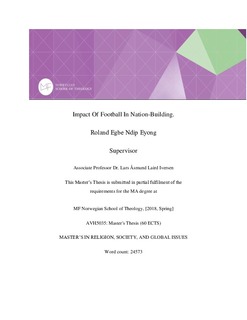Impact of Football in Nation-Building
Master thesis
Permanent lenke
http://hdl.handle.net/11250/2565839Utgivelsesdato
2018Metadata
Vis full innførselSamlinger
Sammendrag
Football has consolidated its place as the world’s most popular sports, but its development potential has been overlooked. "football has been recognized as an important factor in shaping individual and collective senses of self-meaning and belonging" community and identity have become a common theme in histories that chart the rise of the game through industrializing regions (Hughson, 2016 p. 7). FIFA, United Nations, and other world organizations have finetuned their programs to include the field of sports and development. This study examines how these innovations have and continue to happen in the context of nation-building in Argentina, Brazil, Cameroon, South Africa, and Cote d'Ivoire. Using a qualitative review of literature nation-building in this thesis is to analyzes the level of societal scrutiny, behavior, and effects of society on the character of a nation. Sources for this thesis include but not limited to academic articles, books on sports and football, web links, and news media. The theories of participant development and postmodernism are used to establish an understanding of how nation building, and football happen. The findings from the thesis present how football affect nation-building from different societal levels. Football participation can lead to better societal inclusiveness within a nation by emphasizing the shared interests that make us all alike
and change the way people view the nation and its people.
